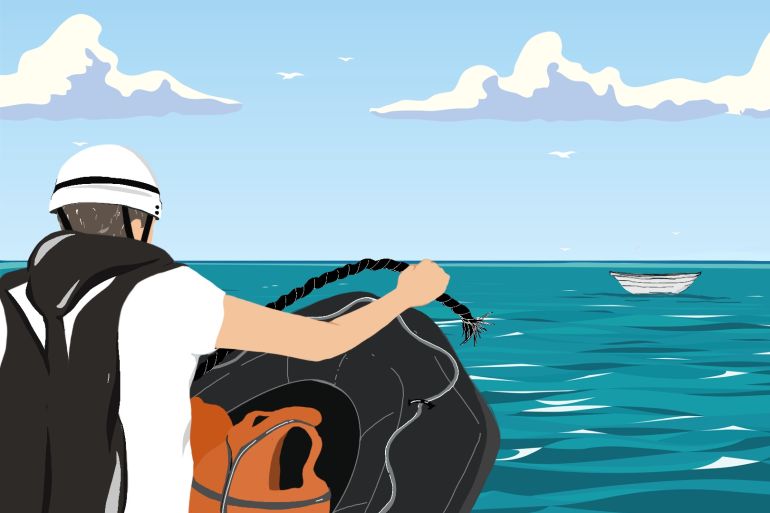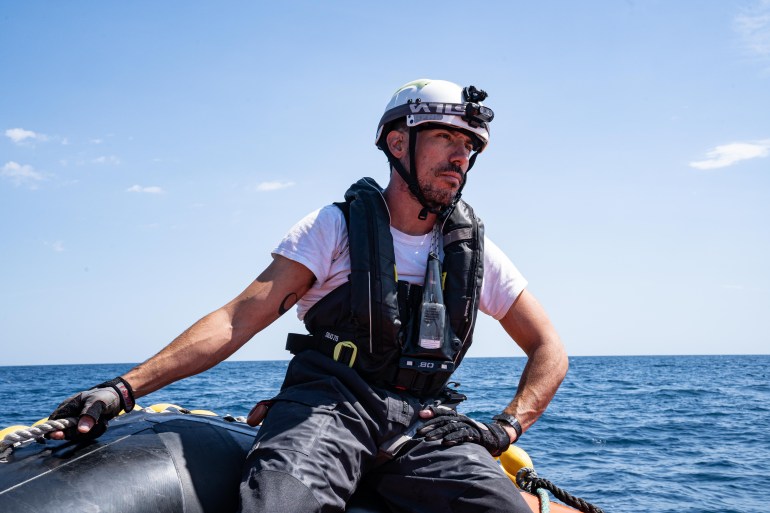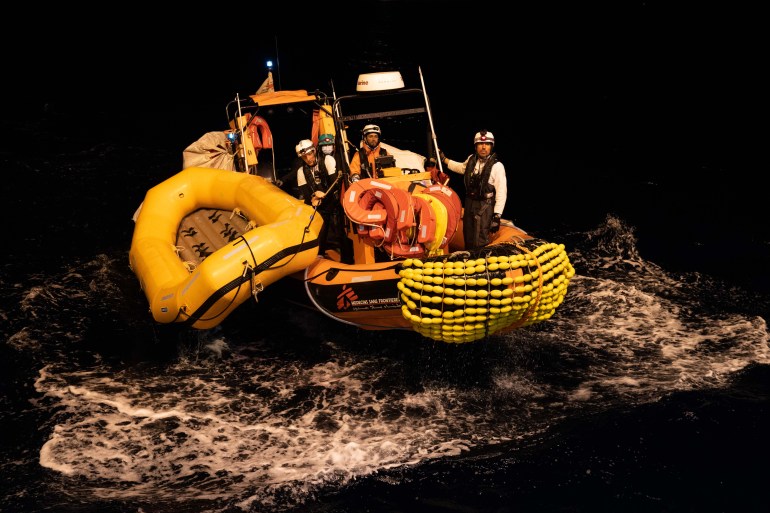A letter to … the rope that pulled the refugees’ bodies out
A rescuer on a ship in the Mediterranean will never forget the day he realised not everyone can be saved.

At 2pm on November 16, 2021, the Geo Barents, a search and rescue ship, responded to a distress call about a severely overcrowded wooden vessel almost 30 nautical miles (55.5km) from the coast of Libya.
Every year, thousands of people try to cross from Libya to either Malta or Italy on boats that are unlikely to last the duration of the journey. The United Nations’ refugee agency estimates that in 2021, 32,400 people made this crossing with 1,553 people dying or going missing on this route, although the real number is likely far higher.
On that day in November, Samuel Cartegena Sanchez, 34, from Elche, Spain, was on one of two rescue boats launched by the Geo Barents, operated by Doctors Without Borders (Medecins Sans Frontieres, or MSF).
It was the team’s second rescue of the day, and Samuel and his colleagues saved 99 people from countries including Guinea, Nigeria, Ivory Coast, Somalia, and Syria.
They worked for three hours, first to transfer the survivors and then the bodies of the 10 people – some of them the brothers and nephews of the survivors – who died.
Dear Rope,
I’m sorry I threw you away. You will always mean so much to me but, really, you had to go. It wasn’t a good idea for me to have a reminder of that day. No matter how much we tried to clean you, you always had that smell – a very particular smell – of saltwater and fuel.
So, I decided to throw away the part of you that I kept. Fulvia threw her bit of you away too.
You remember Fulvia, don’t you? She was the one who coordinated the rescue on the water, relaying messages to the bridge of our ship, the Geo Barents.
I remember when we first met. I was impressed by your quality. You were only two centimetres thick but your black, braided strands were strong enough to tow the two-tonne rescue boats if we needed you to. I already had quite a few years of experience working maritime jobs including a year and a half of search and rescue – but it was your first job.
Fulvia and I were close from the start of our mission, but our trio – you, me and her – began in November on that morning that I will never forget.

Don’t look at the faces
You wouldn’t have seen it from your storage locker in the bow (front) of the boat, but even before the rescue, we could see from the bridge, some 10 metres above sea level, about 100 people on a severely overcrowded boat, tilting at a precarious angle. It was obvious that this was going to be a difficult rescue.
We were only about two dozen miles from the coast of Libya, but I found out later that they had been at sea for more than 24 hours, and some of them were below deck for many hours, which explains why they were so agitated – high on a mixture of fear, relief and intoxication from fuel fumes. As we were arriving on the scene, five people slipped into the water. I remember pulling them out, distributing life jackets to those still on the wooden boat and then transferring them, one by one, to our rescue RHIBs (rigid-hulled inflatable boats). Then we started to ferry them to the safety of the deck of the Geo Barents.
I was so focussed on the rescue that I can’t remember if they were men or women, adults or children.
I do remember someone shouting about bodies or something like that. I looked at Fulvia. She said she had heard something too, but we had to focus on transferring the survivors off the wooden boat.
It was harder to persuade the last three people to come with us. One of them was shouting hysterically, trying to drag something from the lower deck.
That’s when Fulvia started shouting too: “Don’t worry. Don’t worry. Come with us. We are going to take them.”
At one point, she even switched to Italian. I think she knew that he wouldn’t understand her, but it was more about the tone of her voice, knowing she could speak freely and provide more comfort in her mother tongue.
He was totally distraught and clearly intoxicated by the overwhelming fuel fumes, which even I could feel the effects of from our boat. I tried to ignore the headache that was creeping into the middle of my head – a strange feeling of being outside of the situation.
‘10 dead’
Rope, do you remember when the last man finally agreed to come with us? Did you see the doctor and another crewman put on their breathing apparatus, the fumes too intense to work without them, and go below deck on the wooden boat? Do you remember the strong wind and metre-high waves that whipped the side of our boat?
Maybe you were still in your locker when we heard over the radio: “10 dead”.
That was when you became the protagonist in the story.
I remember working with you, as you passed through my hands. Only part of you went below deck on the wooden boat but it was enough for you to bring back that smell – that particular smell – of saltwater and fuel.
You were the one who pulled the bodies up. We passed you to people below deck, who attached you to the body bags secured by the doctor and the crewman. I couldn’t see much through the small hatch, but it must have been awful. When you were secured to the bags, they pushed as we pulled you up.
You eased them free, even though they were stuck in their resting places. You pulled up the rigid bodies, working their limbs through the small, metre-wide, opening, yanking them free when they got stuck so we could carry them to our rescue RHIBs.
The doctor said that they had been dead for several hours but I always wonder what would have happened if we had arrived sooner. Could we have saved them?
I remember how professionally the team worked together. Although at one point I almost lost my focus when I caught a glimpse of one of the bodies. Then someone shouted, “Don’t look at their faces”. My focus returned. I tried not to think about who they were. But they were people. Young people – aged 16 to 28. Some of them were really beautiful.
And so it went on, 10 times you pulled someone free and onto our RHIB and the whole time, the Libyan Coast Guard were there, just a few metres away, just watching us. They didn’t do anything, but still, it was intimidating to have them there.
Once the bodies were on the Geo Barents, we carried them up the stairs to the deck at the top of the ship that we call the “muster station”. We used other ropes to pull them up in one of the hard, orange cradle-stretchers, but those ropes didn’t become a part of my life. Not like you did.
We cleaned the bodies using soap and water, trying to free them of that smell and the destructive fuel that was eating through the body bags.
Did you hear us apologising every time we heard someone’s head knock against the hard metal deck? We all did it, instinctively and repeatedly, forgetting that they couldn’t feel anything.
A thud. “Sorry”.
Another thud. “Sorry”.
We laid the bodies to rest in the ship’s morgue, in fresh, double-lined body bags, waiting to transfer them to the Italian authorities for repatriation. The other survivors told us that the dead were Muslim, so in the smallest of gestures, we held a minute of silence and one of our cultural mediators, also Muslim, said an Islamic prayer.

Our obsession with cleaning you
Working on a search and rescue team at sea, there is always a very real danger of people drowning or dying before we can save them, but fortunately for me, I had never had to work a rescue where people had died. Until that day. The reality of that rescue – of not being able to save everyone – will always be a significant event in my life.
And so life went on. We barely had time to think before we had disembarked the survivors, transferred the dead to the Italian Coast Guard and were returning to the Libyan search and rescue region. We searched for more casualty vessels and we carried out more rescues. But you still had that smell – that particular smell – of saltwater and fuel.
We scrubbed you every day for 30 minutes, Fulvia and I. We pulled you into a tight zigzag between two railings, forming a cradle that could be cleaned. We used soap and water and then sometimes we even added chlorine.
We talked while we worked, about mundane things, but never about you. No matter how hard we scrubbed, you never showed any signs of distress, you just let us continue.
And so you became a form of daily therapy for me and Fulvia. Our obsession with you and your smell came to represent something between us that we needed to get rid of but also that we wanted to preserve. I think Fulvia and I became even closer from this shared experience.
When our mission came to an end in the first days of January, I wasn’t ready to leave you, so that’s why I cut off a little bit of you for Fulvia and another bit for me. I didn’t want your edges to fray so I neatened them using thinner twine, in some sort of attempt to maintain our trio.
I’m not sure what happened to the rest of you. I know the new team leader found out about your role in the recovery of the bodies and our subsequent cleaning ritual and decided it best that you be destroyed. I never saw them throw you away, but now I see a new, white rope in your place.
I often flashback to that day, to that smell – that particular smell – of saltwater and fuel, like the other day during stretcher training when I volunteered to be the patient. As I lay in the stretcher being pulled up the stairs, I thought about the bodies we pulled up the same stairs in the same stretcher using the same ropes. But I forced myself to think about something else. Something less sad.
That’s why I threw you away. You reminded me of sadness.
The day we threw you away, Fulvia had sent me a message saying, “Samu, it still smells”. She had kept her bit of you outside, clipped on her balcony railing back home in Rome, yet she could still smell you.
You’ll always be important to me because you are linked to my memory of That Day, but I had to get rid of you. I tossed my bit of you in the bin. No ceremony. Nothing. I just needed to let you go. It was the right thing to do, but it definitely feels good to talk about you again.
Yours,
Samu
As told to Lexie Harrison-Cripps.
Edited and condensed for clarity and length.